U.S. State Flags
This page lists of the various symbols in the U.S. State Flags group.
The flags of the U.S. states exhibit a wide variety of regional influences and local histories, as well as widely different styles and design principles. Modern state flags date from the 1890s when states wanted to have distinctive symbols at the 1893 World's Columbian Exposition in Chicago. Most state flags were designed and adopted between 1893 and World War I.
Symbols in this group:
Flag of Alabama
The current flag of the state of Alabama (the second in the state's history) was adopted by Act 383 of the Alabama state legislature on February 16, 1895
Flag of Alaska
The flag of the state of Alaska consists of eight gold stars, forming the Big Dipper and the North Star, on a dark blue field. The Big Dipper is an asterism in the constellation Ursa Major which symbolizes a bear, an animal indigenous to Alaska. As depicted on the flag, its stars can be used as a guide by the novice to locate Polaris and determine true north, which varies considerably from a magnetic north.
Flag of Arizona
The flag of the state of Arizona consists of 13 rays of red and weld-yellow on the top half, the colors of the flag of Spain, representing the 13 original states. The red and yellow also symbolize Arizona's picturesque sunsets. The copper star represents the copper mining industry in Arizona. The rest of the flag is colored blue, representing liberty.
Flag of Arkansas
The flag of the state of Arkansas is a red field charged with a large blue-bordered white diamond. Twenty-nine five-pointed stars appear on the flag: twenty-five small white stars within the blue border, and four larger blue stars in the white diamond. The inscription "ARKANSAS" appears in blue within the white diamond, with one star above and three stars below. The star above and the two outer stars below point upwards; the inner star below points downwards.
Flag of California
The Bear Flag is the official flag of the state of California. The precursor of the flag was first flown during the 1846 Bear Flag Revolt and was also known as the Bear Flag.
Flag of Colorado
The flag of the state of Colorado consists of three horizontal stripes of equal width; the top and bottom stripes are blue, and the middle stripe white. On top of these stripes sits a circular red "C", filled with a golden disk. The blue is meant to represent the skies, the gold is said to either stand for the sunshine enjoyed by the state or the gold mined traditionally in the state of Colorado, the white represents the snowcapped mountains and the red represents the red colored earth (from Spanish colorado, meaning “colorful”).
Flag of Connecticut
The flag of the state of Connecticut consists of a white baroque shield with three grapevines (each bearing three bunches of purple grapes) on a field of azure blue. The banner below the shield reads "Qui Transtulit Sustinet", ("He who transplanted still sustains"), the state's motto. The flag dimensions are 5.5 feet (1.7 m) in length and 4.33 feet (1.32 m) in width.
Flag of Delaware
The flag of the state of Delaware consists of a buff-colored diamond on a field of colonial blue, with the coat of arms of the state of Delaware inside the diamond. Below the diamond, the date December 7, 1787, declares the day on which Delaware became the first state to ratify the United States Constitution. The colors of the flag reflect the colors of the uniform of General George Washington.
Flag of Florida
The flag of Florida consists of a red saltire, St. Andrew's Cross, on a white background, with the state seal superimposed on the center. The design was approved by a popular referendum in 1900. The current design has been in use since 1985, after the state seal was graphically improved and officially sanctioned for use by state officials.
Flag of Georgia
The current flag of the U.S. state of Georgia was adopted on May 8, 2003.
Flag of Hawaii
The flag of the state of Hawaii (Hawaiian: Ka Hae Hawaii) is the official standard symbolizing Hawaii as a U.S. state. The same flag had also previously been used by the kingdom, protectorate, republic, and territory of Hawaii. It is the only U.S. state flag to feature the Union Flag of the United Kingdom, a holdover of the period in Hawaiian history when it was under the influence of the British Empire.
Flag of Idaho
The Seal of the Territory of Idaho was adopted in 1863, and redrawn several times before statehood in 1890. The state Great Seal was designed by Emma Edwards Green, the only woman to design a state seal.
Flag of Illinois
The Great Seal of the State of Illinois is the official emblem of the State, and signifies the official nature of a document produced by the State of Illinois. The flag of the state of Illinois consists of the seal of Illinois on a white background, with the word "Illinois" underneath the seal.
Flag of Indiana
The flag of Indiana was designed by Paul Hadley and officially adopted by the state of Indiana on May 31, 1917. It was the state's first official flag and has remained unchanged since then except for the creation of a statute to standardize the production of the flag.
Flag of Iowa
The flag of the state of Iowa consists of three vertical stripes of blue, white, and red, reflecting Iowa's history as part of the French Louisiana Territory.
Flag of Kansas
The flag of the state of Kansas was adopted in 1927. The elements of the state flag include the state seal and a sunflower. This original design was modified in 1961 to add the name of the state at the bottom of the flag.
Flag of Kentucky
The flag of the Commonwealth of Kentucky was adopted on March 26, 1918.
Flag of Louisiana
The flag of Louisiana consists of a heraldic charge called a "pelican in her piety," representing a mother pelican wounding her breast to feed her young from the blood. This symbol, emblematic of Christian charity, is also found on the state seal. On the flag it is depicted above a ribbon with the state motto: "Union, Justice, and Confidence". The current flag was adopted in 2006, revising the original pelican design of 1912.
Flag of Maine
The flag of the state of Maine features the state coat of arms on a blue field. In the center of the shield, a moose rests under a tall pine tree. A farmer and seaman represent the traditional reliance on agriculture and the sea by the state. The North Star represents the state motto: Dirigo ("I Lead").
Flag of Maryland
The flag of the state of Maryland consists of the heraldic banner of George Calvert, 1st Baron Baltimore. It is the only state flag in the United States to be based on English heraldry. (While the flag of Washington, D.C., is a representation of the coat of arms of the Washington family, Washington, D.C., is not a state.) It was officially adopted by Maryland in 1904.
Flag of Massachusetts
The commonwealth of Massachusetts' flag in the United States has been represented by official but limited-purpose flags since 1776, though until 1908 it had no state flag per se to represent its government.
Flag of Michigan
The Flag of the State of Michigan depicts the state's coat-of-arms on a dark blue field, as set forth by Michigan state law.
Flag of Minnesota
The flag of the state of Minnesota consists of a medium blue field charged with the state seal. The current flag was adopted in 1957 and the state seal in the flag was modified in 1983.
Flag of Mississippi
The flag of the State of Mississippi was adopted by the U.S. state of Mississippi in 1894, replacing the flag that had been adopted in 1861.
Flag of Missouri
The Flag of the State of Missouri was designed and stitched in Cape Girardeau, Missouri, by Marie Elizabeth Watkins Oliver (1885–1959), the wife of former State Senator R.B. Oliver.
Flag of Montana
The flag of the state of Montana consists of the image of the Montana state seal centered on a blue field.
Flag of Nebraska
The flag of the state of Nebraska is a blue cloth charged with the state seal.
Flag of Nevada
The flag of the state of Nevada consists of a cobalt blue field with a silver star in the upper left hand corner, surrounded by the state name "Nevada." Above this is a golden-yellow scroll with the words "Battle Born," indicating that Nevada became a state during the American Civil War. Below the star are two sprays of green sagebrush (the state flower) with yellow flowers.
Flag of New Hampshire
The State of New Hampshire has held two seals since it declared its independence from Great Britain on January 5, 1776. While both seals have been retained, most people are only familiar with the Great Seal due to its corporate use.
Flag of New Jersey
The Coat of arms of the State of New Jersey was originally designed by Pierre Eugene du Simitiere in 1777 and was modified slightly in 1928.
Flag of New Mexico
The flag of the state of New Mexico consists of a red sun symbol of the Zia on a field of yellow. The colors honor Isabella I of Castile, her Habsburg heirs and the conquistadors who explored in her name.
Flag of New York
The coat of arms of New York is the coat of arms used by the State of New York. The flag of the State of New York is the coat of arms on a solid-blue background. The state seal of New York is the coat of arms surrounded by the words "The Great Seal of the State of New York."
Flag of North Carolina
The flag of the State of North Carolina is defined by law as follows:
Flag of North Dakota
The design for the flag of the state of North Dakota is an almost exact copy of the unit banner carried by the state's troop contingent in the Philippine-American War. It was adopted by the North Dakota Legislative Assembly on March 3, 1911, although the color was not precisely specified at that time. Legislation in 1943 brought the flag in line with the original troop banner, which is on display at the North Dakota Heritage Center in Bismarck. The flag also resembles the Great Seal of the United States.
Flag of Ohio
The flag of the state of Ohio was adopted in 1902 and designed by John Eisemann, for the 1901 Pan-American Exposition.
Flag of Oklahoma
The flag of the state of Oklahoma consists of a traditional Osage Nation buffalo-skin shield with seven eagle feathers on a sky blue field.
Flag of Oregon
The flag of the state of Oregon is a two-sided flag in navy blue and gold with an optional gold fringe. On the front is the escutcheon from the state seal and on the reverse is a gold figure of a beaver, the state animal. Oregon is the only U.S. state to have a two-sided flag.
Flag of Pennsylvania
The flag of the Commonwealth of Pennsylvania consists of a blue field on which the state coat of arms is embroidered.
Flag of Rhode Island
The flag of the state of Rhode Island and Providence Plantations is white and consists of a gold anchor in the center (a symbol for hope) surrounded by thirteen gold stars (for the original 13 colonies and Rhode Island's status as the 13th state to ratify the Constitution). A blue ribbon below the anchor bears the state's motto in gold: "HOPE." The flag is frequently depicted with golden fringe around the edges of the flag.
Flag of Rhode Island
The flag of the state of Rhode Island and Providence Plantations is white and consists of a gold anchor in the center (a symbol for hope) surrounded by thirteen gold stars (for the original 13 colonies and Rhode Island's status as the 13th state to ratify the Constitution). A blue ribbon below the anchor bears the state's motto in gold: "HOPE." The flag is frequently depicted with golden fringe around the edges of the flag.
Flag of South Carolina
The flag of the state of South Carolina has, in some form, existed since 1775, being based on one of the first Revolutionary War flags. South Carolina's flag was ranked as the 10th best designed state or provincial flag in North America by the North American Vexillological Association in 2001.
Flag of South Dakota
The flag of the state of South Dakota represents the U.S. state of South Dakota with a field of sky blue charged with a version (in navy blue on white) of the state seal in the center, surrounded by gold triangles representing the sun's rays, surrounded in turn by inscriptions in gold sans-serif capitals of "SOUTH DAKOTA" on top and "THE MOUNT RUSHMORE STATE" (the state nickname) on the bottom. The inscription on the bottom was "THE SUNSHINE STATE" before it was changed in 1992.
Flag of Tennessee
The flag of the state of Tennessee consists of an emblem on a field of red, with a strip of blue on the fly. The emblem of the middle consists of three stars on a blue circle
Flag of Texas
The Flag of the State of Texas is defined by law as follows:
The state flag is a rectangle that has a width to length ratio of two to three and contains (1) one blue vertical stripe that has a width equal to one-third the length of the flag, (2) two equal horizontal stripes, the upper stripe white, the lower stripe red, each having a length equal to two-thirds the length of the flag, and (3) one white, regular five-pointed star located in the center of the blue stripe, oriented so that one point faces upward, and sized so that the diameter of a circle passing through the five points of the star is equal to three-fourths the width of the blue stripe. The red and blue of the state flag are the same colors used in the United States flag.
Flag of Utah
The flag of the state of Utah was adopted in 1913 and consists of the seal of Utah encircled in a golden circle on a background of dark navy blue.
Flag of Vermont
The flag of the state of Vermont consists of the state's coat of arms and motto. The Vermont General Assembly adopted the current flag on June 1, 1923.
Flag of Virginia
The Seal of the Commonwealth of Virginia is the official seal of the Commonwealth of Virginia, a U.S. state. The flag of Virginia consists of the obverse of the seal against a blue background. The current version of the flag was adopted at the beginning of the American Civil War in 1861. The flag may be decorated with a white fringe along the fly.
Flag of Washington
The flag of the state of Washington consists of the state seal (which bears an image of George Washington) on a field of dark green with gold fringe being optional. It is the only U.S. state flag with a field of green as well as the only state flag with the image of an American president.
Flag of West Virginia
The flag of the state of West Virginia consists of the state's coat of arms on a white field with a dark blue border.
Flag of Wisconsin
The flag of the state of Wisconsin is a blue flag charged with the state coat of arms. Originally designed in 1863 when regiments from Wisconsin wanted a flag for battlefield use, it wasn't until 1913 that state statutes specified the design of the state flag.
Flag of Wyoming
The flag of the state of Wyoming consists of the silhouette of an American Bison. The red symbolizes the Native Americans and the blood of pioneers who gave their lives. The white is a symbol of purity and uprightness. The blue is the color of the skies and distant mountains. It is also a symbol of fidelity, justice and virility. The bison represents the local fauna while the seal on it symbolizes the custom of branding livestock.
Citation
Use the citation below to add this symbols group page to your bibliography:
Style:MLAChicagoAPA
"U.S. State Flags Symbols." Symbols.com. STANDS4 LLC, 2025. Web. 21 Jan. 2025. <https://www.symbols.com/group/2/U.S.+State+Flags>.


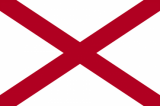
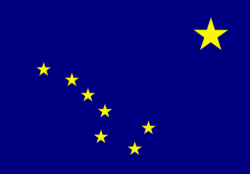
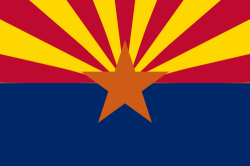
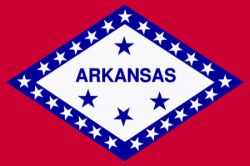
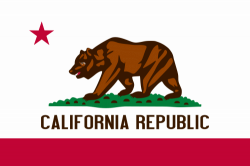
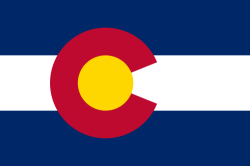


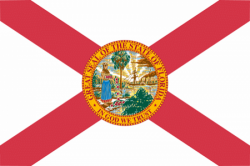
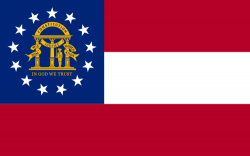
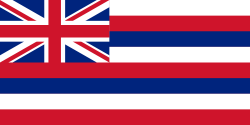
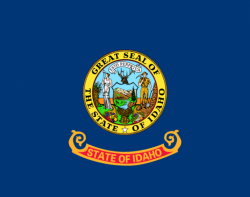
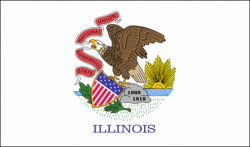
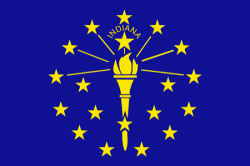
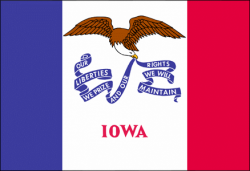
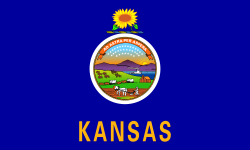
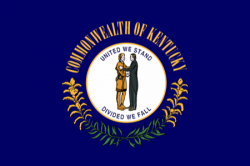
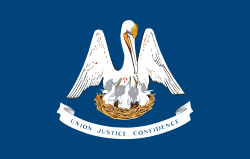

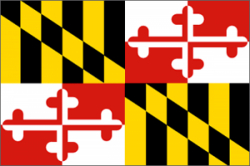

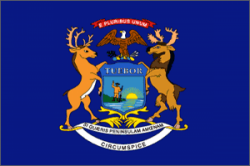

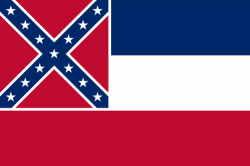
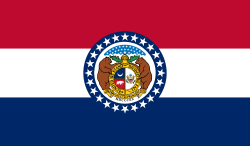
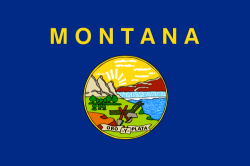
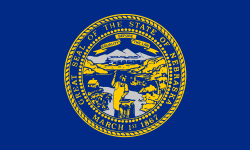
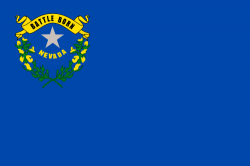
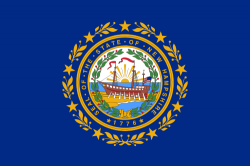

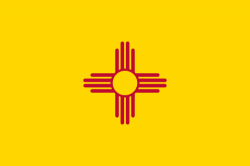

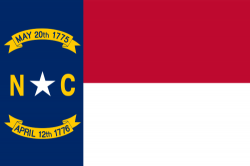
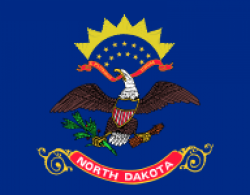
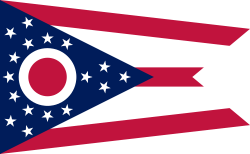
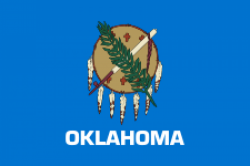
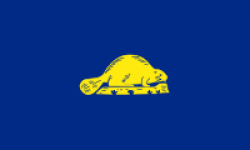
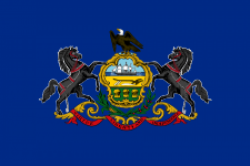


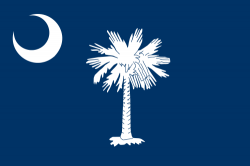
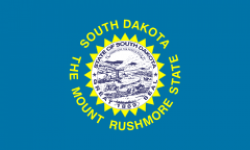
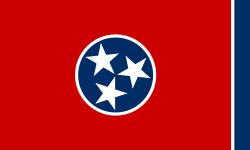
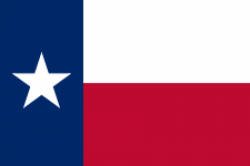
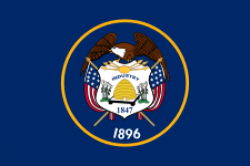
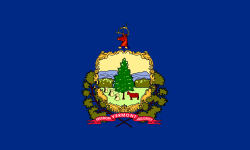
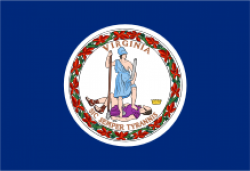
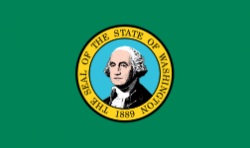

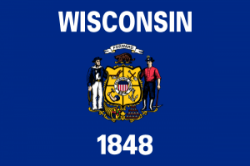
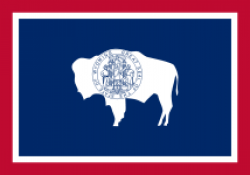
Have a discussion about the U.S. State Flags group with the community:
Report Comment
We're doing our best to make sure our content is useful, accurate and safe.
If by any chance you spot an inappropriate comment while navigating through our website please use this form to let us know, and we'll take care of it shortly.
Attachment
You need to be logged in to favorite.
Log In